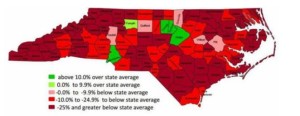 We talk a lot here at Women AdvaNCe about the lack of balance in our state. Women earn less than men. People of color make pennies on the white worker’s dollar. Rural moms lose babies at higher rates, and urban kids end up with better schools.
We talk a lot here at Women AdvaNCe about the lack of balance in our state. Women earn less than men. People of color make pennies on the white worker’s dollar. Rural moms lose babies at higher rates, and urban kids end up with better schools.
A >>recent report by the U.S. Bureau of Labor Statistics shows that these disparities are even more stark than previously thought. Only five counties in North Carolina have incomes above the state average. Statistically speaking, that’s significant — that means workers in 5% of the state make so much more than the other 95% that they skew the average.
Predictably, incomes are lowest in NC’s most rural counties — in the mountains and in the agricultural areas in the southeast. The vast majority of workers in these areas make at least 25% below the state average. The state’s wealth is concentrated in Orange, Durham, Wake, Mecklenburg, and Forsyth counties.
So why is this a problem? Primarily because lawmakers pass bills that cater to our wealthiest residents. They turn down Medicaid expansion, limit food stamps, and defund pre-k programs. In affluent areas such as Orange County, these regressive policies affect a select few — and often there are plenty of structures (namely, in the form of nonprofits) in place to help those in need.
But in counties like Cherokee and Robeson, where tax revenue is low and most of the residents are in need, there just isn’t enough help. And outcomes continue to grow worse over time. Recently, the NC legislature decided to limit the amount of time workers can receive food stamps before getting cut off. Now if those in need can’t find a job within three months, they — and their families — will go hungry.
The lack of Medicaid expansion means rural hospitals are closing. In some areas families have to drive 90 minutes to get to a primary care physician or trauma center. Women in these areas are statistically unhealthy. They have high rates of obesity, diabetes, and adverse maternal outcomes. Infants in these areas have mortality rates that rival those of third world countries.
Lawmakers plan to use the rankings in the new report from the U.S. Bureau of Labor Statistics to help develop an improved system of spurring economic development in needy counties. Clearly, the current system isn’t working — but will a new one be any better?
Economic development funds need to be channeled to where they can be most effectively used. But greater change is needed. When the General Assembly passes laws that decrease the amount of social services that can be accessed by the needy, it increases the disparities in our state.
This is beyond unfair. This is not what North Carolina stands for. Every resident in this state should have an equal chance at economic security and happiness, no matter where they live.


There are no comments
Add yours